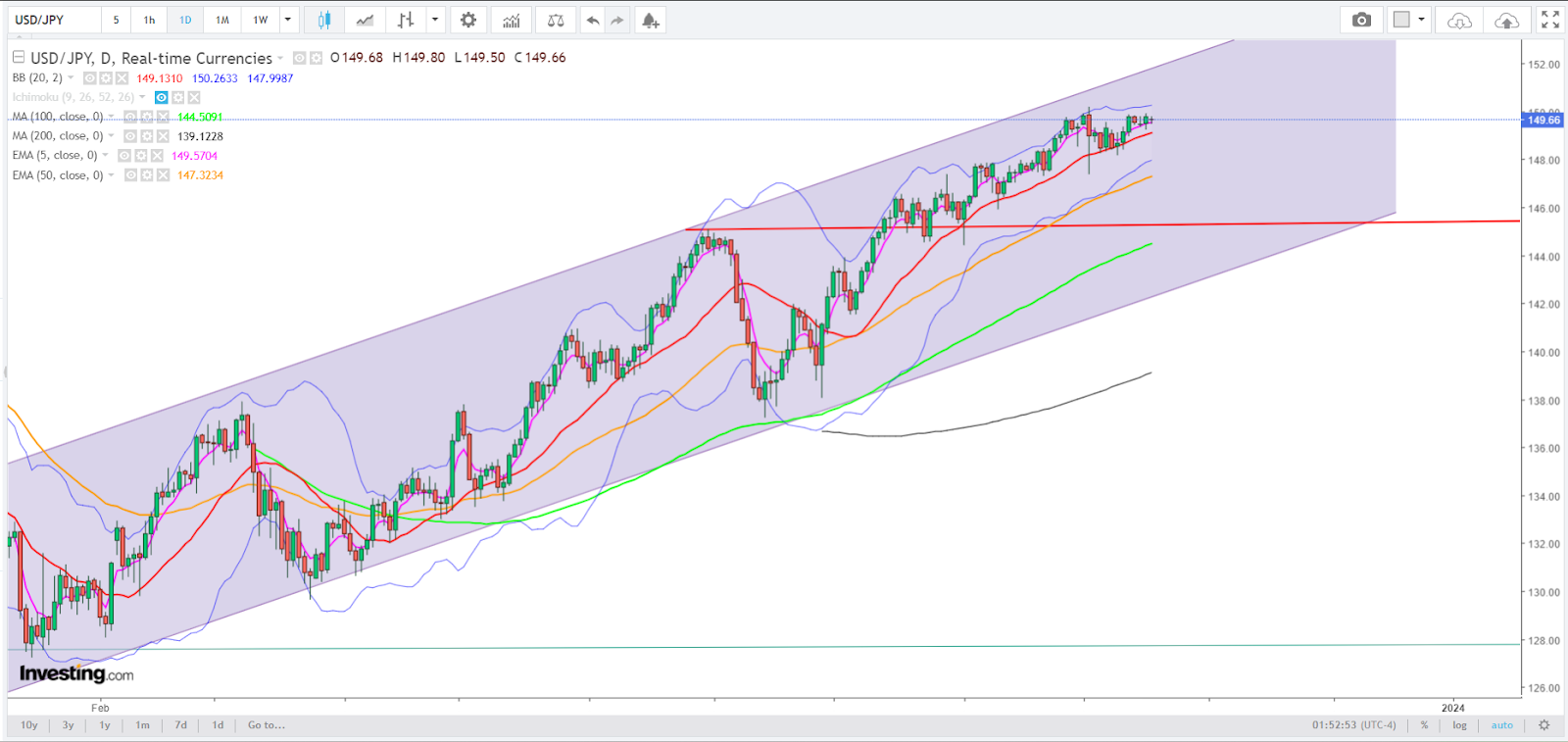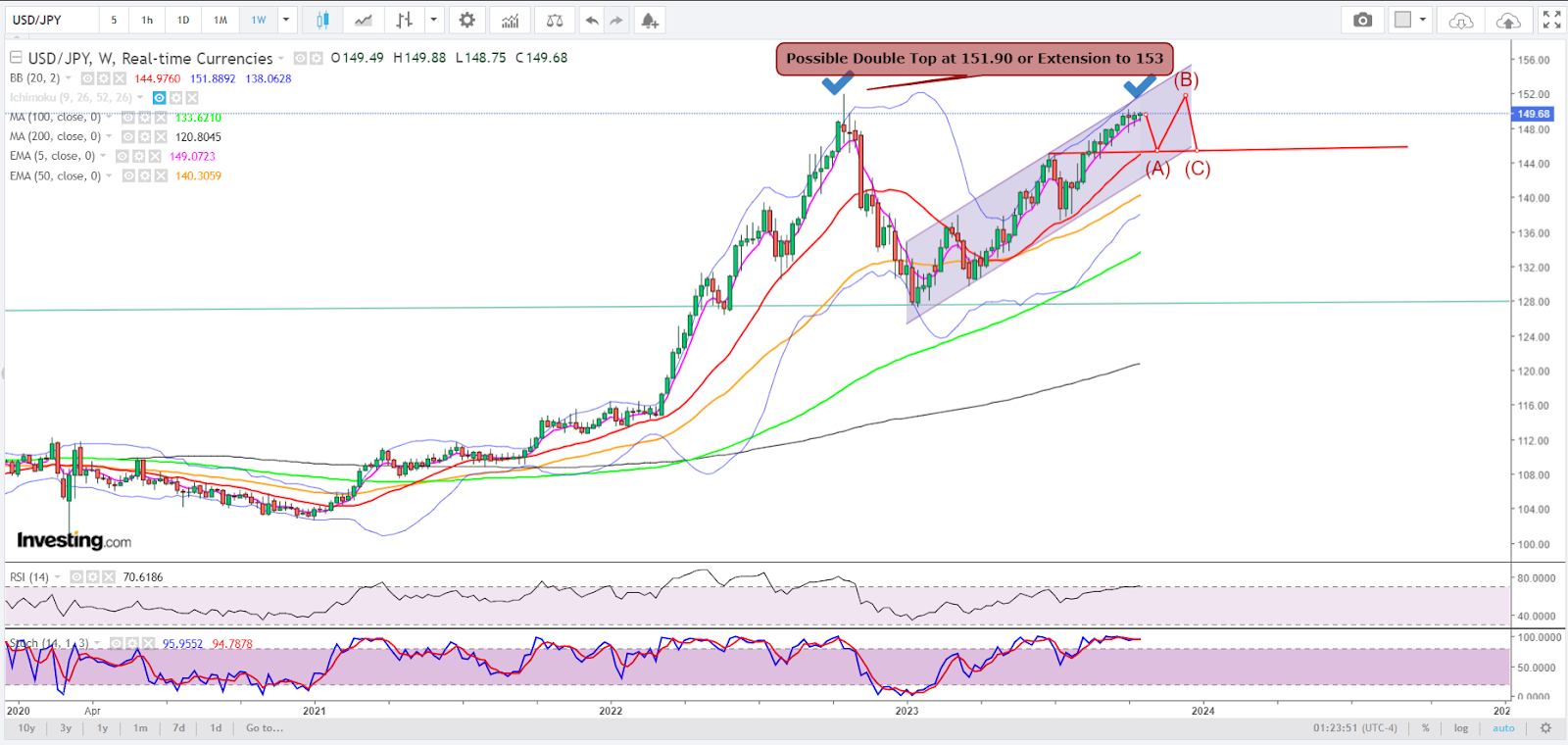- Periodic weakness in the dollar might delay but not prevent yen decimation
- If Dollar Index weakness extends to 105.40 and below, USJ-JPY could see 148
- Consolidation above 149 may resume uptrend, resulting in 153 target
- The last time USD/JPY breached 153 was in in July 1987
USD/JPY, one of the year’s favorite currency plays, could be on track to a 36-year high in favor of the US dollar, though the Japanese component of the pair could regain some strength in the near term.
Asian currencies caught a boost from better-than-expected Chinese economic data on Wednesday, driving the yuan to a one-week high and putting a damper on the dollar versus the yen as well.
At the time of writing, USD/JPY was moderately lower at 149.69, versus the session low of 149.84 and Tuesday’s close of 149.80.
The Dollar Index itself — which pits the greenback against six other majors, namely the euro, Japanese yen, British pound, Swiss franc, Swedish krona, and Canadian dollar — was at 106.11. That was down 1.2% from the 11-month high of 107.35 set on Oct 3.

Charts by SKCharting.com, with data powered by Investing.com
Investing.com’s analysis of USD/JPY, in collaboration with SKCharting.com suggests a near-term target of 148.
Said Sunil Kumar Dixit, chief technical strategist at SKCharting:
“In the event of current Dollar Index weakness extends to 105.40 and below, we may witness a pull back in the dollar yen pair to 148.
Consolidation above horizontal support zone 149 and 148 may resume uptrend, which will likely target 153.”
That target would be no ordinary one. The last time the dollar traded at $153 versus the yen was in July 1987, when it hit 153.45.
The Ying and the Yen
Just two weeks ago, the Japanese government was in the news for its apparent — but never officially confirmed — intervention to prop up the yen to resist the year-low of 150.18 on Oct 3.
From a range of plausible scenarios examined by Investing.com, including that of Japanese currency officials playing bogeymen again to defend the yen, none seem to offer a long-term fix for the ills plaguing the JPY.
The dollar was in a far less enviable position in early July amid the notion that the Federal Reserve was done with its rate hikes, after 11 increases since March 2022 that added 5.25 percentage points to a base rate of just 0.25%.
But from mid-July to late September, the greenback saw a super-charged rally instead from a shift in thinking about the Fed stance of rates, leading to the 11-month high of 107.35 on Oct 3.
Since then, market opinion has again shifted on whether the central bank would do a hike before the end of the year, at its two remaining policy meetings in November and December. That has led to some renewed volatility in the dollar versus other majors.
But what sets the dollar apart the yen is the preferential treatment accorded to the greenback by markets.
Even if the Fed doesn’t hike any more, the markets may do its work in keeping inflation under control by continuing to increase bond yields to tighten financial conditions for the real economy, increasing borrowing spreads for corporates and households and inducing greater volatility in asset prices (including putting a leash on oil). The central bank may not — or may never — get to its cherished 2% per year target for inflation, with the current 3.7% possibly stabilizing at 3.0-3.2%.
US bond yields, meanwhile, could continue going north, occasionally pulling the dollar along for a free ride. The yield on the 10-year Treasury note could at some point chart new peaks beyond Tuesday’s near 4.8%, which is already the highest since August 2007.
Time… And Every Imaginable Odd Stacked Against the Yen
With the yen though, the odds are stacked against it at every turn. Firstly, the chance of the BOJ doing a policy U-turn before the end of the year is highly remote. The odds don’t get better even over the longer time horizon. The yield on the Japanese 10-year note has barely budged above 0.76%.
The BOJ’s real problem, as multiple analyses suggest, is time — or rather, the lack of it.
Right now, Japan’s central bank can’t abandon its ultra-easy monetary policy settings because the ‘virtuous cycle’ between wage growth and inflation is not yet self-sustaining. While Japan is battling inflation, it’s also fighting sluggish economic growth, challenging demographics and a deflationary mindset among its people that make a sustainable pickup in wages next year anything but certain.
Until that becomes a plausible scenario in itself, the BOJ is unlikely to significantly alter yield curve control – the policy of suppressing bond yields lower than where market forces would normally dictate – nor lift its key overnight policy rate from -0.1%.
So, we may go into late 2024 — or well beyond that, provided it even gets there — for the BOJ to unwind its super-easy settings.
Thus, back to the question: Can Japan effectively defend the yen?
Bloomberg reported on Tuesday that BoJ’s new Core CPI forecast for the fiscal year 2023 is likely to approach 3%, up from 2.5% as of July, and be set at 2% or more in sight for the fiscal year 2024. A higher inflation forecast indicates that the BoJ is confident about an increase in wages, which would drive inflation higher.
After traversing the Japanese financial, macro, social and forex landscape, the short answer from our analysis at Investing.com is “highly unlikely”.
Technical Outlook

The bullish early October momentum in USD was supported by the 5-week EMA, or Exponential Moving Average, of 149.10, Dixit of SKCharting said, adding:
“A further breakout above the swing high 150.18 awaits triggers which may get clues from eventual Dollar Index DXY reclaiming 107.40.”
While much will depend on the charge of the Dollar Index and bond yields — amid rapidly evolving political situations like the Middle East conflagration between Israel and Hamas — an advance of USD/JPY could target 151.96, resulting in what is called “a double top” in the short term.
Said Dixit:
“Given the broadly weaker fundamentals of the yen, there are higher odds for bullish action in the USD that maintains stability within the ascending channel that has resistance at 151.90, followed by short term consolidation affected by the potential double top.
153 would be the mid term target if the bullish wave is established above 151.90 with day/week close above the zone.”
***
Disclaimer: The aim of this article is purely to inform and does not in any way represent an inducement or recommendation to buy or sell any commodity or its related securities. The author Barani Krishnan does not hold a position in the commodities and securities he writes about. He typically uses a range of views outside his own to bring diversity to his analysis of any market. For neutrality, he sometimes presents contrarian views and market variables.
